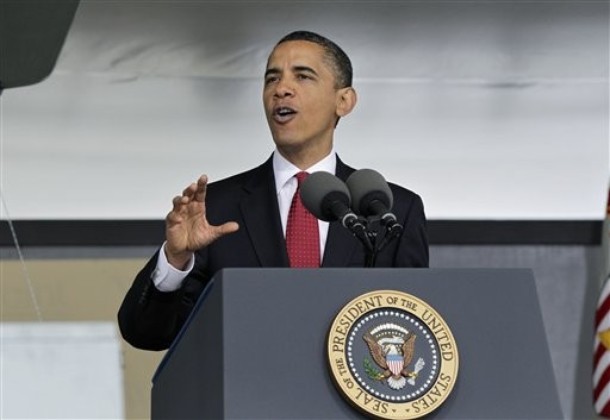Obama's West Point speech attacked.

Arthur Herman isn't impressed with President Obama's multilateralism:
'The one object of Obamaâ??s disapprobation in his speech was not Iran or North Korea but George W. Bush. Obama never mentioned Bush by name, but he took a stab at his predecessor, saying that that under his administration the war against al-Qaeda has been â??going better in recent months than in recent years.â? (If itâ??s going so well, then why is Dennis Blair being forced out as director of national intelligence?) Another implicit criticism of Bush was Obamaâ??s claim that â??America has not succeeded by stepping outside the currents of international cooperation.â? Yet it was precisely Bushâ??s willingness to move away from that current that has offered the nation one key foreign-policy success that Obama is eager to seize: Iraq. We owe what Obama called â??the emergence of a democratic Iraq that is sovereign, stable, and self-reliantâ? to George W. Bushâ??s willingness to defy conventional world opinion on Iraq. Bush was willing to apply Americaâ??s military might, and to persist â?? despite savage attacks from Senator Obama and others who would have preferred to cut and run â?? because he saw a different future. And that future was made possible because Bush took actions that were at odds with what is called the international community. He unleashed our soldiers to fight the enemy, and fight they did.In that sense, Saturdayâ??s speech was a sad but revealing episode â?? and an ill-timed one, coming one week before Memorial Day. The alternative to Obamaâ??s vision was, literally, staring him in the face. Without ready military power and the will to use it, even the most exquisite diplomacy is useless.
'
This is rather surreal. Before the graf above, Herman is denouncing the Obama administration's failure with respect to North Korea and Iran. Fair enough. But President Bush had eight long years to "solve" these problems - and didn't. Now, unlike Herman, I didn't think it was possible for President Bush to solve those problems (at least in a manner that would satisfy Herman) but then I'm not the one castigating President Obama for not stopping North Korea or Iran's nuclear program.
And what of Herman's solution? Invoking Iraq in this context, President Bush's "willingness to defy international opinion," and the paean to "military power" leads me to believe that Herman thinks only wars against North Korea and Iran will suffice to manage the threat. With Iran, at least, this is a debatable proposition and reasonable people can disagree. With respect to North Korea there is much less debate: absent North Korean troops pouring over the DMZ, no one with a modicum of good sense would advocate attacking North Korea. To even casually float the idea is deeply unserious.
So yes, mulitlateral institutions don't always work well and they can't "solve" every foreign policy problem under the sun. But what Herman is arguing here is that the Obama administration should abandon its engagement strategy in favor of a war against both Iran and North Korea. The result of such a policy would put the U.S. in a manifestly worse place than it is now.
